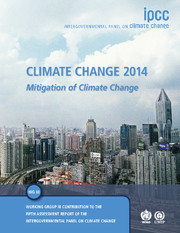 Climate Change 2014: Mitigation of Climate Change
Climate Change 2014: Mitigation of Climate Change Book contents
- Frontmatter
- Foreword, Preface, Dedication and In Memoriam
- Contents
- Summary for Policymakers
- Technical Summary
- Chapters
- Chapter 1 Introductory Chapter
- Chapter 2 Integrated Risk and Uncertainty Assessment of Climate Change Response Policies
- Chapter 3 Social, Economic, and Ethical Concepts and Methods
- Chapter 4 Sustainable Development and Equity
- Chapter 5 Drivers, Trends and Mitigation
- Chapter 6 Assessing Transformation Pathways
- Chapter 7 Energy Systems
- Chapter 8 Transport
- Chapter 9 Buildings
- Chapter 10 Industry
- Chapter 11 Agriculture, Forestry and Other Land Use (AFOLU)
- Chapter 12 Human Settlements, Infrastructure, and Spatial Planning
- Chapter 13 International Cooperation: Agreements & Instruments
- Chapter 14 Regional Development and Cooperation
- Chapter 15 National and Sub-national Policies and Institutions
- Chapter 16 Cross-cutting Investment and Finance Issues
- Annexes
- Index
Chapter 2 - Integrated Risk and Uncertainty Assessment of Climate Change Response Policies
from Chapters
Published online by Cambridge University Press: 05 February 2015
- Frontmatter
- Foreword, Preface, Dedication and In Memoriam
- Contents
- Summary for Policymakers
- Technical Summary
- Chapters
- Chapter 1 Introductory Chapter
- Chapter 2 Integrated Risk and Uncertainty Assessment of Climate Change Response Policies
- Chapter 3 Social, Economic, and Ethical Concepts and Methods
- Chapter 4 Sustainable Development and Equity
- Chapter 5 Drivers, Trends and Mitigation
- Chapter 6 Assessing Transformation Pathways
- Chapter 7 Energy Systems
- Chapter 8 Transport
- Chapter 9 Buildings
- Chapter 10 Industry
- Chapter 11 Agriculture, Forestry and Other Land Use (AFOLU)
- Chapter 12 Human Settlements, Infrastructure, and Spatial Planning
- Chapter 13 International Cooperation: Agreements & Instruments
- Chapter 14 Regional Development and Cooperation
- Chapter 15 National and Sub-national Policies and Institutions
- Chapter 16 Cross-cutting Investment and Finance Issues
- Annexes
- Index
Summary
Introduction
This framing chapter considers ways in which risk and uncertainty can affect the process and outcome of strategic choices in responding to the threat of climate change.
‘Uncertainty’ denotes a cognitive state of incomplete knowledge that results from a lack of information and/or from disagreement about what is known or even knowable. It has many sources ranging from quantifiable errors in the data to ambiguously defined concepts or terminology to uncertain projections of human behaviour. The Guidance Note for Lead Authors of the IPCC Fifth Assessment Report on Consistent Treatment of Uncertainties (Mastrandrea et al., 2010) summarizes alternative ways of representing uncertainty. Probability density functions and parameter intervals are among the most common tools for characterizing uncertainty.
‘Risk’ refers to the potential for adverse effects on lives, livelihoods, health status, economic, social and cultural assets, services (including environmental), and infrastructure due to uncertain states of the world. To the extent that there is a detailed understanding of the characteristics of a specific event, experts will normally be in agreement regarding estimates of the likelihood of its occurrence and its resulting consequences. Risk can also be subjective in the sense that the likelihood and outcomes are based on the knowledge or perception that a person has about a given situation. There may also be risks associated with the outcomes of different climate policies, such as the harm arising from a change in regulations.
There is a growing recognition that today's policy choices are highly sensitive to uncertainties and risk associated with the climate system and the actions of other decision makers. The choice of climate policies can thus be viewed as an exercise in risk management (Kunreuther et al., 2013a). Figure 2.1 suggests a risk management framework that serves as the structure of the chapter.
After defining risk and uncertainty and their relevant metrics (Section 2.2), we consider how choices with respect to climate change policy options are sensitive to risk and uncertainty (Section 2.3).
- Type
- Chapter
- Information
- Climate Change 2014: Mitigation of Climate ChangeWorking Group III Contribution to the IPCC Fifth Assessment Report, pp. 151 - 206Publisher: Cambridge University PressPrint publication year: 2015
- 290
- Cited by


